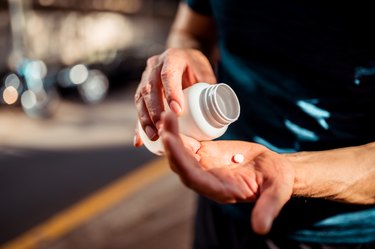
You're not the only one whose medicine cabinet stash has doubled in size over the past few years. It seems like there's a new, flashy supplement on the block each day, promising better sleep, immunity or overall health.
And while popping a vitamin pill seems easy enough, there are plenty of ways to mess up this seemingly mindless routine. Below, experts explain the common mistakes people make when taking vitamins and other supplements.
Video of the Day
Video of the Day
1. Forgetting to Talk to Your Doctor First
It's best to take supplements with the advice of a doctor or dietitian, especially if you take medications on a regular basis.
If you think you might be deficient in a certain nutrient, talk to your doctor, who can run blood tests to find out what nutrients you're deficient in and which supplements you actually need.
If you decide to take a supplement without your doctor's help, you should still do as much research as possible. The Memorial Sloan Kettering Cancer Center and National Center for Complementary and Integrative Health both offer herb and drug databases that can tell you a little more about the potential risks of any supplements or medicines you may be taking.
"Supplements can interfere with medications and can even interfere with lab results," New York-based endocrinologist Deena Adimoolam, MD, tells us. So when you do visit your doc, it's extremely important to let them know of all the supplements you use, she says.
2. Using Them to Fix a Poor Diet
One of the most common mistakes people make is using supplements to fix unhealthy eating habits, says Penny Kris-Etherton, PhD, a Penn State professor of nutritional sciences
"Most people think that supplements can 'cure' the ills of a poor diet," she says. "Dietary supplements are useful in providing nutrients that are taken in less-than-recommended amounts." But they shouldn't replace nutritious foods.
Kris-Etherton recommends that people follow the current Dietary Guidelines for Americans to get an idea of what their daily diet should look like.
"From there, supplements provide an insurance policy to help people meet their nutrient needs when their diet falls short," Kris-Etherton says. "However, if a person's diet is really bad, supplements will not 'correct' for all of the deficiencies of eating poorly."
3. Not Looking for a Verification Mark
The FDA doesn't use the same regulation standards for dietary supplements as other medications, according to the administration's website. While supplement companies aren't allowed to falsely advertise products or mismark bottles, there isn't much government verification going on.
That's why you should buy supplement bottles with third-party verification seals, like the "USP Verified" label from the U.S. Pharmacopeia (USP), per the Mayo Clinic. The USP is an independent nonprofit organization that tests supplements to ensure they're safe for the public.
On a supplement bottle, the USP seal confirms that the supplements contain the correctly labeled ingredients, potency and dosage, according to the organization's website. The USP also verifies that supplements don't contain any harmful contaminants or chemicals.
4. Taking High Doses
More isn't necessarily better and that applies with dosage, too, Kris-Etherton says. Unless your doctor advises otherwise, you should always follow the dosage recommendations on supplement packaging.
"Many people think that if one supplement capsule is good for health, more might be better and take too many of one or more supplements," she says. "There are safety concerns about taking high doses of some supplements."
You also want to be cautious when taking gummy vitamins, Dr. Adimoolam recommends. They may seem innocent because they taste like candy but you should still follow the proper dosage. And if you find yourself snacking on a few extra each day, switch to pill form.
If you take too much of a supplement, you're also more likely to experience any of the unwanted side effects, Kris-Etherton says. For some nutrients or vitamins, this may not be a big deal but others can react with your medications, causing health issues.
5. Not Checking the Expiration Date
Many people may not even know that supplements expire. (You might want to go check if that 3-year-old bottle of vitamin C chews in your cabinet is still good.)
Over time, supplements lose their efficacy, especially if they're left in especially hot or cold temperatures, according to the Mayo Clinic. And after a certain point, they probably won't provide any benefit at all.
Related Reading